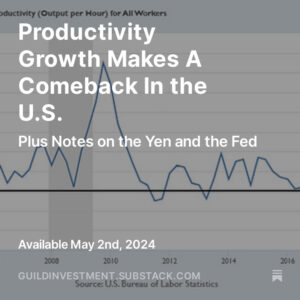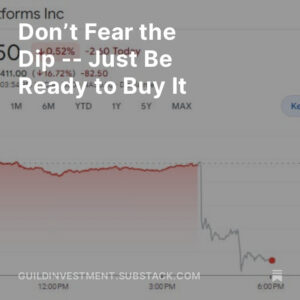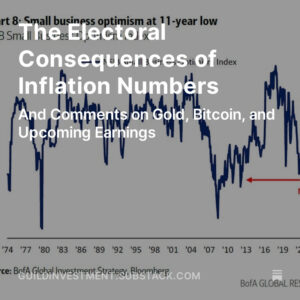In recent letters, we’ve written about the investment opportunities we see emerging outside the United States. This week, we’ll describe two: Japan and South Korea. (Next week, we’ll follow up with Hong Kong and India).
Japan
The Nikkei index is recovering to highs not seen since the early 90s, signaling the possibility of a breakout of the Japanese market after almost three decades of stagnation.

Based on the weight of the economic, financial, and political evidence, we are bullish on Japanese stocks.
Due to the Japanese market’s long period of underperformance, Japanese equities are under-owned by both foreign and domestic holders. Fundamentally, Japanese industrial companies are well-positioned to grow and improve their profit margins. After years of underwhelming interest in Japan, a chart breakout of the Nikkei could turn capital flows back towards Japan’s stock market. Trend followers would gain interest, short sellers would cover, and interest from global investors would ramp up. If Japan returns to a long-term bull market, some of the interest of the U.S.’ newly burgeoning set of growth-stock investors might turn across the Pacific.
In terms of the pandemic, Japan has fared relatively well compared to the United States and Europe, with a much smaller burden of cases and mortalities. While the decline in economic activity was not as severe, the snapback has also been more muted.
Nevertheless, as The Institutional Strategist’s Larry Jeddeloh comments, “Japan is a warrant on global growth, and once again, the stars seem to be aligning in Japan’s favor.” We have noted throughout our recent letters that we believe the combination of the pandemic waning and fiscal and monetary authorities easing, the world is set to see a strong expansion in 2021. Historically, Japan has been a beneficiary of such trends, given its leading presence in high-tech manufacturing, precision machinery, robotics, heavy equipment, chemicals, pharmaceuticals, digital entertainment, electronics, autos and high-tech automotive components — particularly smart and electric vehicles. As a group, Japanese companies are the world’s third-biggest automotive manufacturers by units, and like Korea (as we note below), Japan is well-positioned to ride the wave of the global transportation supercycle that is underway as economies move towards decarbonization and electrification of transport.
Some of Japan’s large trading-house conglomerates (sōgō shōsha) — in which Warren Buffet recently took stakes — are cheaply valued and have significant dividend yield. The companies in which Buffet acquired a nearly 5% stake are Itochu [8001: JP], Marubeni [8002: JP], Mitsubishi [8058: JP], Mitsui [8031: JP], and Sumitomo [8053: JP]. (Some of these trade via over-the-counter ADR shares in the U.S. We are not recommending them, but noting them for interested investors.)
Further, the new Suga administration is pursuing a business digitization agenda which may be instrumental in prodding Japanese corporates to make more capital expenditures.
There are also long-term processes at work helping to slowly bring Japan out of its decades of underperformance. Japanese corporate governance has long differed greatly from corporate governance in the United States and Europe, particularly with regard to requirements for corporate disclosures, transparency about executive compensation, and shareholder engagement. Non-Japanese shareholders have welcomed the steps taken in recent years to facilitate shareholder activism, and those steps seem to be bearing fruit, with rising shareholder proposals meeting greater acceptance from management. This should lead to bigger dividends , increased payout ratios from Japanese companies, and increased foreign demand for Japanese shares.

Taken together, these near- and longer-term factors suggest good economics, strengthening demand for Japanese stocks from both domestic and foreign buyers, and the possibility of ongoing strong technical market performance in a virtuous cycle. U.S.-based investors have many ETFs available for Japan which will allow them to participate in the broad market via various indexes. In our view, although there are several currency-hedged Japan ETFs available, the dollar is likely to continue its decline against the yen, and we would choose unhedged instruments at this juncture.
South Korea
We are bullish on the South Korean economy, and on equities in certain South Korean sectors and industries.
One of our factors for evaluating the desirability of a foreign market is the behavior of its currency, since currency losses can easily outstrip nominal gains in equity prices. The Korean Won has seen steady appreciation against the U.S. dollar since the panic lows in mid-March, and we believe it can continue to strengthen, given the relative lack of resistance to that appreciation by the Bank of Korea.

On Korean stocks themselves, a few observations.
We noted last week that geopolitical and trade tensions between the U.S. and China are unlikely to abate significantly under a Biden administration, since we believe they are driven by more than passing domestic U.S. political trends. The behavior of the Trump administration towards China as a trading partner and would-be global hegemon differed in tone and style from previous U.S. policy, but the realities it addressed predated that administration and will outlast it.
That produces both headwinds and tailwinds for Korea. China is by far South Korea’s largest trading partner, so trade tensions between the U.S. and China are a challenge to many South Korean corporates with significant exposure to Chinese markets.

With that said, though, the potential benefits to South Korea from the ongoing realignment are very large. South Korea is a tech dominated economy, and the sidelining of Chinese manufacturers will give an impetus to many Korean companies, including Samsung [005930: KRX], which has Chinese giant Huawei as one of its main competitors. Korea is also strong in networking equipment, in focus due to the global rollout of 5G, where a hobbled Huawei will also boost Korea. Without access to U.S. technology, SMIC is another Chinese tech giant whose sidelining could benefit Korea. And finally, Korea is a leader in computer memory, including DRAM and NAND; while Chinese memory companies have not yet been blacklisted, they may yet be in U.S. policymakers’ sights.
Beyond tech proper, we note that Korea is well-situated due to its strengths in both automotive manufacture and tech to take advantage of the emerging global supercycle of high-tech electric and smart vehicle manufacture. Hyundai [005380: KRX] and Mobis [012330: KRX] would be potential beneficiaries of this trend.
On other fronts, while South Korea has not been a hotbed of pharma innovation, it has been a hotbed of high-tech pharma manufacturing. Korean CMOs (contract manufacturing organizations) may benefit from a ramp-up in global biosimilar adoption (the generic versions of complex large-molecule biologics that have driven so much therapeutic advancement in recent decades).
Domestic Korean internet platforms are also interesting. Korea’s domestic internet market has successfully resisted much of the penetration of big U.S. platforms. Local platforms such as Kakao [035720: KRX] and Naver [035420: KRX] are both growing their markets across the usual panoply of media, e-commerce, and fintech offerings, and are worth watching for those who want to dive deeper than whole-market U.S.-based ETFs.
Thanks for listening; we welcome your calls and questions.
Please note that principals of Guild Investment Management, Inc. (“Guild”) and/or Guild’s clients may at any time own any of the stocks mentioned in this article, and may sell them at any time. In addition, for investment advisory clients of Guild, please check with Guild prior to taking positions in any of the companies mentioned in this article, since Guild may not believe that particular stock is right for the client, either because Guild has already taken a position in that stock for the client or for other reasons.







